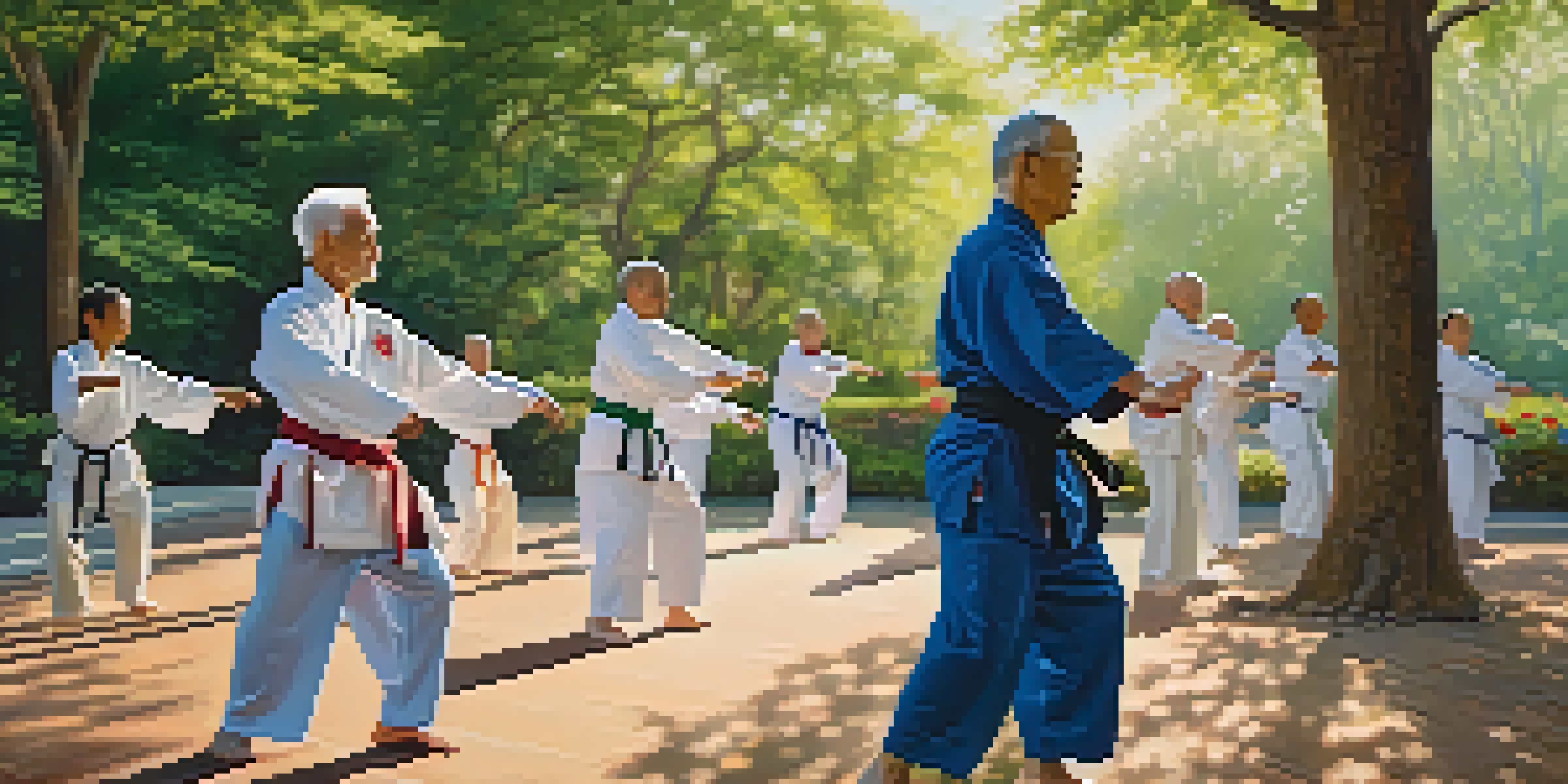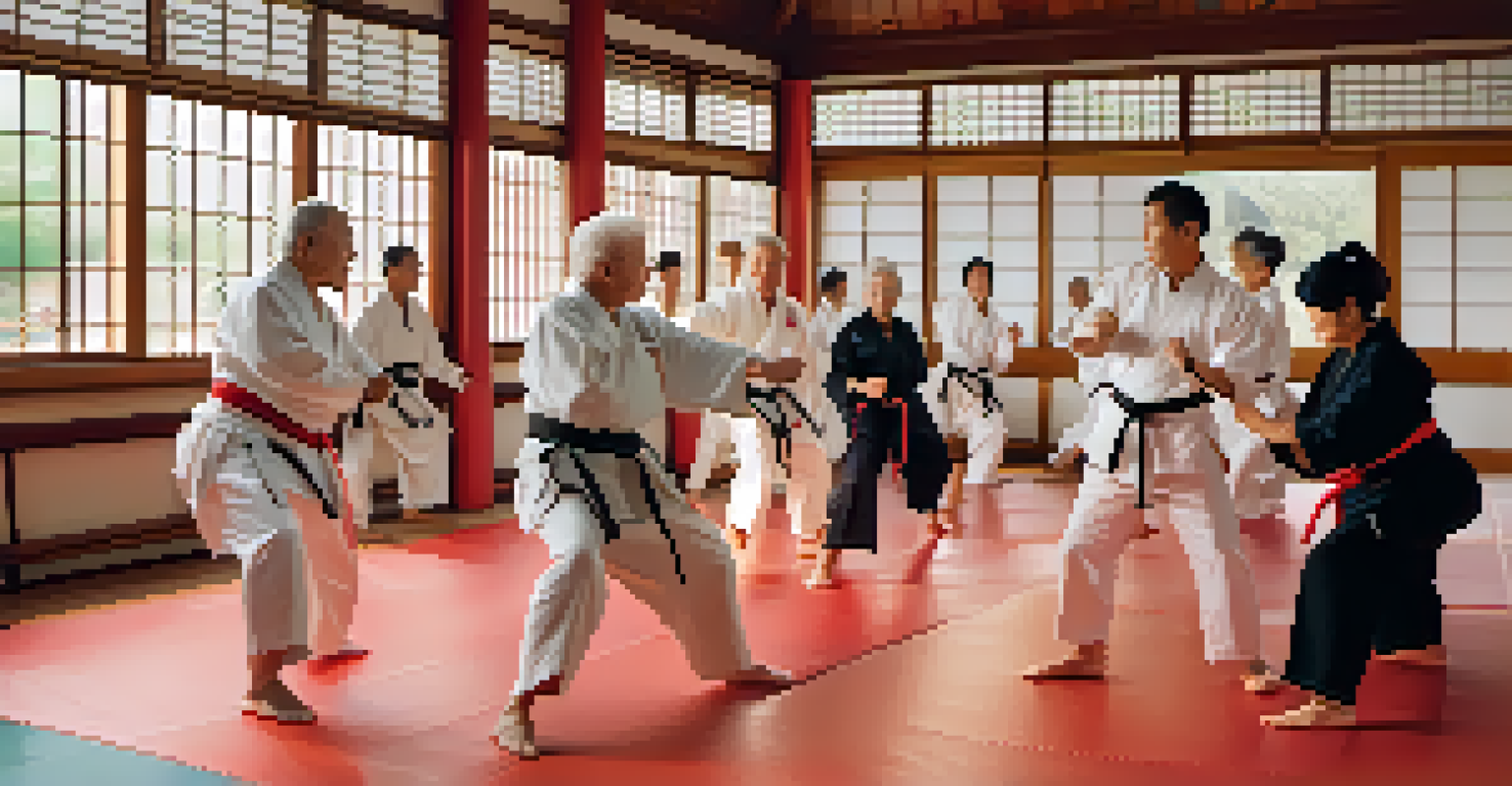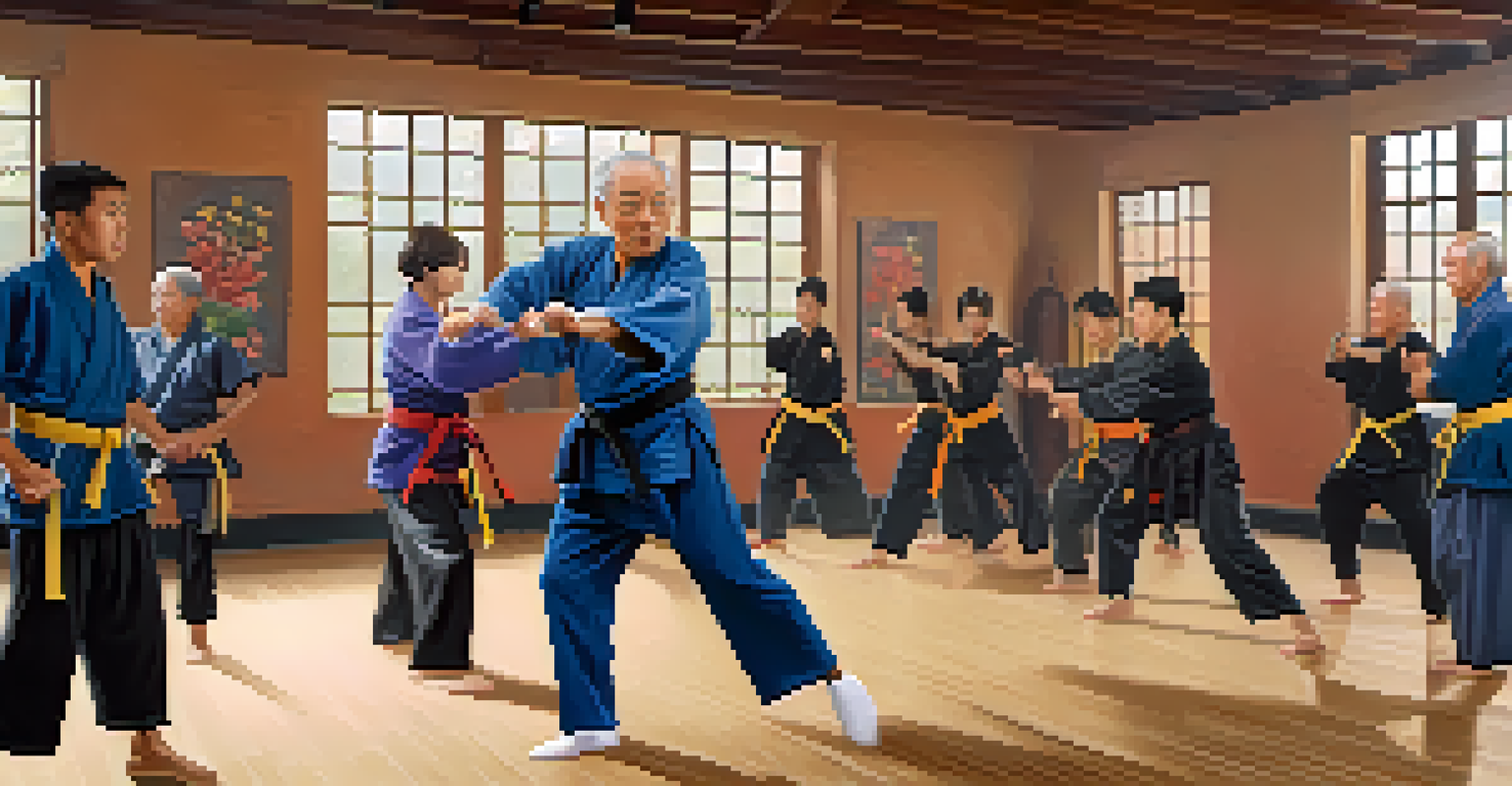The Benefits of Martial Arts for Aging Adults' Health

Improved Physical Fitness Through Martial Arts
Martial arts provide a fantastic way for aging adults to enhance their physical fitness. Engaging in striking, kicking, and defensive maneuvers can significantly boost strength, flexibility, and stamina. These activities are not only enjoyable but can also help seniors maintain a healthy weight and improve overall body composition.
Martial arts is not about the physical strength, but the strength of the mind.
For instance, practicing techniques like tai chi or karate can enhance balance and coordination, which are essential for preventing falls—a common concern among older adults. This makes martial arts an effective way to incorporate fitness into daily routines without the monotony of traditional exercises.
Moreover, the martial arts environment fosters a sense of community, encouraging older adults to stay motivated and engaged. Participating in classes with peers creates social bonds that contribute positively to mental health and emotional well-being.
Enhancing Mental Agility and Focus
Martial arts aren’t just about physical prowess; they also stimulate mental agility and focus. As aging adults learn new techniques and forms, they engage their minds, enhancing cognitive functions such as memory and concentration. This mental exercise is crucial for combating age-related cognitive decline.

For example, memorizing sequences of moves can sharpen recall skills, while the strategic aspects of martial arts encourage critical thinking. This combination of mental and physical challenges can keep the mind active, much like a game of chess that requires strategic planning and foresight.
Boosts Physical Fitness for Seniors
Martial arts enhance strength, flexibility, and stamina, helping aging adults maintain a healthy lifestyle.
In addition, martial arts often emphasize mindfulness practices, such as meditation and breathing techniques. These practices help reduce stress and anxiety, allowing seniors to cultivate a calmer, more focused mindset.
Boosting Confidence and Self-Esteem
One of the most significant benefits of martial arts for aging adults is the boost in confidence and self-esteem that comes with training. As individuals learn and master new skills, they experience a sense of accomplishment that can be incredibly empowering. This newfound confidence can extend beyond the dojo, positively impacting various aspects of their lives.
The greatest victory is that which requires no battle.
For instance, an older adult who has developed self-defense skills may feel more secure when navigating their environment, whether walking alone or dealing with unfamiliar situations. This sense of security can lead to greater independence and a more active lifestyle.
Moreover, many martial arts schools foster a supportive environment where respect and encouragement are paramount. This community atmosphere can help seniors build strong relationships, further enhancing their confidence and overall well-being.
Promoting Social Interaction and Community
Martial arts serve as a wonderful platform for social interaction, which is vital for aging adults. Classes often bring people together, creating friendships and support networks that can help combat loneliness—a common issue among seniors. The camaraderie developed in these settings can lead to lasting connections.
Imagine a group of seniors practicing karate together; they not only share the experience of learning but also bond over their challenges and successes. These shared moments can foster a sense of belonging and community that enriches their lives.
Enhances Mental Focus and Agility
Learning martial arts techniques improves cognitive functions and combats age-related decline.
Additionally, many martial arts programs offer events and competitions, providing further opportunities for social engagement. Participating in these activities can enhance motivation and provide seniors with a sense of purpose as they connect with others.
Improving Balance and Coordination
As we age, maintaining balance and coordination becomes increasingly important. Martial arts training focuses heavily on these skills, using techniques that require precise movements and body control. This practice can significantly reduce the risk of falls, which are a leading cause of injury in older adults.
For example, the slow, controlled movements of tai chi are particularly beneficial for improving balance. This style emphasizes fluid transitions and stability, making it accessible for seniors while effectively enhancing their physical capabilities.
By regularly practicing martial arts, aging adults can not only improve their physical stability but also gain greater awareness of their body's movements. This heightened awareness can lead to more confident and safer everyday activities.
Cultivating Discipline and Resilience
Martial arts training instills a sense of discipline and resilience that can greatly benefit aging adults. The structured environment encourages participants to set goals, whether it's mastering a new technique or achieving a belt rank. This focus on personal growth can be incredibly rewarding.
For older adults, learning to persevere through challenges can translate into other areas of life. The lessons learned on the mat, such as patience and determination, can empower them to face obstacles with a positive attitude.
Fosters Social Connections and Support
Participating in martial arts classes creates friendships and community, combating loneliness among seniors.
Additionally, the practice of martial arts requires regular commitment, fostering a routine that can help seniors stay active and engaged. This discipline not only improves their martial arts skills but also contributes to a healthier, more balanced lifestyle.
Learning Self-Defense for Peace of Mind
One of the most practical benefits of martial arts for aging adults is the ability to learn self-defense techniques. Knowing how to protect oneself can provide a tremendous sense of security, especially in today’s world. This empowerment can enhance their overall quality of life, allowing them to move through their environments with confidence.
For instance, self-defense classes often focus on strategies that are suitable for individuals of all ages and abilities. Many techniques emphasize evasion and escape rather than confrontation, making them practical and effective for seniors looking to boost their personal safety.

Moreover, the skills acquired in self-defense training can help seniors feel more in control of their lives. This control can lead to greater independence, allowing them to engage in activities they enjoy without fear.
Enhancing Overall Quality of Life
Ultimately, the benefits of martial arts for aging adults culminate in an enhanced overall quality of life. The combination of physical fitness, mental acuity, social engagement, and self-defense skills contributes to a holistic approach to health that is both rewarding and fulfilling. As seniors embrace martial arts, they often find renewed vitality and purpose.
For example, seniors who practice martial arts report increased energy levels and improved mood, which can lead to a more active and engaged lifestyle. This positive change often encourages them to explore new activities and hobbies, enriching their lives even further.
Boosting Physical Fitness
Martial arts enhance strength, flexibility, and stamina, making them an engaging fitness option for aging adults.
As a result, martial arts can serve as a powerful tool for aging adults, promoting not just physical health but also emotional and social well-being. By integrating martial arts into their routine, seniors can enjoy a vibrant and active life well into their golden years.